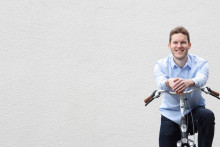It’s funny, really. Bikes are crucial in Dutch urban traffic and nearly every municipality actively promotes the use of bikes over cars. But apparently, there’s hardly any information to base decisions on. Sander Veenstra is here to change that. ‘I present data to the city of Enschede. They can use that to analyse trends or effects of interventions, such as the new ‘bicycle highway’, a high-quality bicycle path connecting the cities in the Region of Twente.’
Sander is a PDEng candidate. He started out as a traditional PhD student, but soon discovered that wasn’t his cup of tea. ‘I wanted to create something tangible.’ Sander switched to the PDEng variant of promotional research, where the focus lies on engineering rather than doing research.
‘I connect different data sources on bicycle traffic in Enschede to each other. Where is everybody going? Where did they come from? How crowded are certain bicycle paths at what time?’ Enschede already had a lot of historic data that the engineer could use. However, there is a common misconception: ‘Data isn’t the same as information,’ Sander explains. ‘The first step is to extract the data, which isn’t always as easy as it seems. We needed several months to get access to the data that’s collected by traffic lights. Then, you need to process data before they get meaning. I create a solution for data-processing and presentation, so that policy-makers can analyse what they need.’
Comfort zone
Sander’s project has a number of ICT-aspects in it. ‘I’m a traffic engineer, not an information specialist. But for this project, I had to learn things as programming. It took me out of my comfort zone.’
A PDEng trajectory is only two years instead of four. Sander: ‘I’m officially out of time by now. But the app isn’t quite ready, so I’m working on it in my own time.’ Not without reason though. Sander has the ambition to valorise his work. ‘I want to show what I can do and I know that it’s of use to other municipalities and cyclists themselves as well.’







